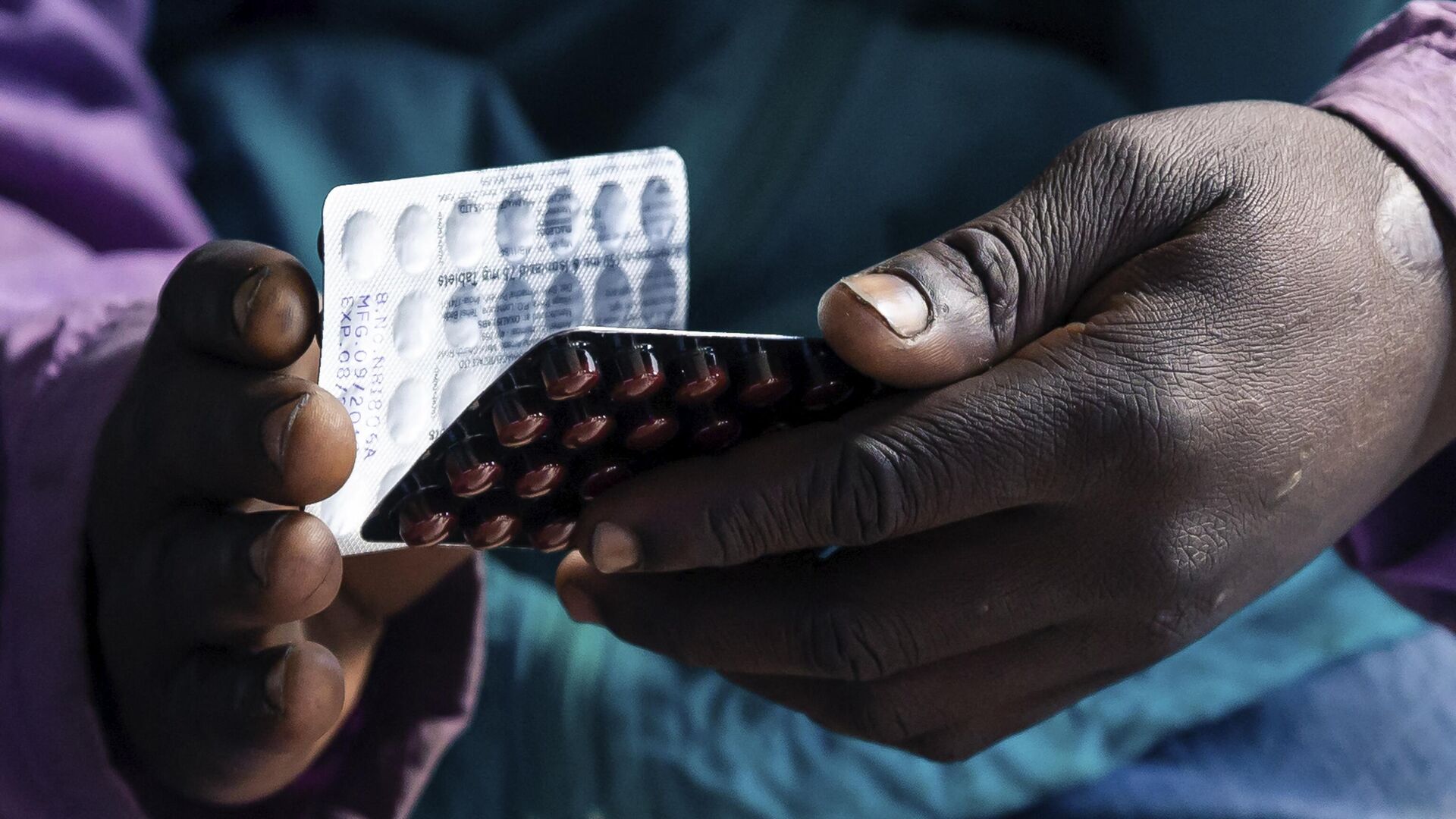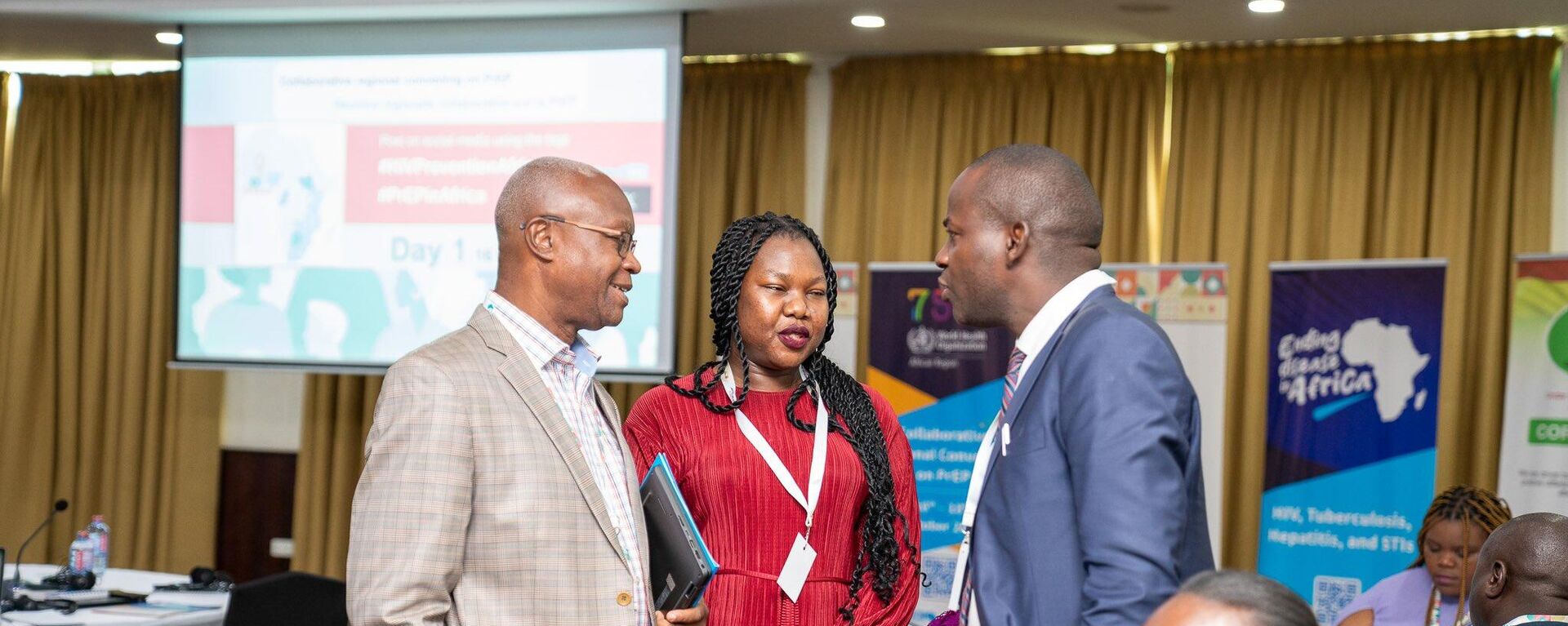https://en.sputniknews.africa/20231201/zimbabwe-marks-turning-point-in-hivaids-prevention-as-president-urges-to-raise-awareness-1063896568.html
Zimbabwe Marks Turning Point in HIV/AIDS Prevention as President Urges to Raise Awareness
Zimbabwe Marks Turning Point in HIV/AIDS Prevention as President Urges to Raise Awareness
Sputnik Africa
Every year, on December 1, the world commemorates World AIDS Day. According to the UN data, in 2022, 1.3 million people in the world were newly infected with... 01.12.2023, Sputnik Africa
2023-12-01T17:42+0100
2023-12-01T17:42+0100
2023-12-01T18:01+0100
sub-saharan africa
zimbabwe
southern africa
botswana
eswatini (swaziland)
united nations (un)
unaids
united nations children's fund (unicef)
emmerson mnangagwa
hiv/aids
https://cdn1.img.sputniknews.africa/img/07e7/0c/01/1063897871_0:40:3072:1768_1920x0_80_0_0_c4f0e61713779994700d5d5e51735ff1.jpg
Zimbabwe has successfully contained the HIV/AIDS pandemic and attained the 95-95-95 Joint United Nations Programme (UNAIDS) goals, which led to decline in infections rate and lethal cases, Zimbabwean President Emmerson Mnangagwa said in his speech to mark World AIDS Day, the local media reported.Mnangagwa reportedly declared that over the past decade, his country has shown a record of 78% reduction in the number of new HIV infections.This summer, the UNICEF also stated that Zimbabwe has made "great strides" in HIV/AIDS prevention. Estimated HIV prevalence rates have more than halved, from 25% in 2002 to approximately 11.58% in 2021. Likewise, AIDS incidence (new HIV infections) and deaths, which peaked in 1994, have declined sharply to less than 20,200 in 2021.As of July 2023, 96% of adults know their status; 96% of adults who are living with HIV are on treatment, and 93% of adults who are on treatment have a suppressed viral load, the UNICEF data showed.However, despite successful results, the president urged the nation to further pursuit HIV prevention and talked about some of the other remaining challenges.Mnangagwa proceeded, reportedly saying that the nation's HIV response has to address the root causes of new infections, which include underage marriages, violence against women, and cultural practices that endanger men, women, and children.Zimbabwe is not the only African country that has already reached such a high bar in fighting this deadly disease. According to the UNAIDS, Botswana, Eswatini, Rwanda, and Tanzania have accomplished these goals, too.Moreover, the UNAIDS reported that 16 more nations are on the verge of achieving "95-95-95" targets, eight of which are in sub-Saharan Africa, the region which accounts for 65% of all HIV-positive individuals.Human immunodeficiency virus (HIV) is an infection that targets the body’s immune system. It attacks the body’s white blood cells, which leads to weakening of the immune system.HIV is spread from the body fluids of an infected person. However, it cannot be spread through kisses, hugs, sharing food, towels, silverware, dishes, etc.HIV can be treated and prevented, in those contacting with infection, with antiretroviral therapy. If it remains untreated, though, it can progress to AIDS, which is the most advanced stage of the disease.
https://en.sputniknews.africa/20231017/a-giant-leap-african-countries-collaborate-to-scale-up-hiv-prevention-efforts-1062874963.html
zimbabwe
southern africa
botswana
eswatini (swaziland)
Sputnik Africa
feedback@sputniknews.com
+74956456601
MIA „Rossiya Segodnya“
2023
Christina Glazkova
https://cdn1.img.sputniknews.africa/img/07e7/0b/07/1063380906_0:0:673:674_100x100_80_0_0_79628b4d0cd9f29291a57aa13bbf9e7a.jpg
Christina Glazkova
https://cdn1.img.sputniknews.africa/img/07e7/0b/07/1063380906_0:0:673:674_100x100_80_0_0_79628b4d0cd9f29291a57aa13bbf9e7a.jpg
News
en_EN
Sputnik Africa
feedback@sputniknews.com
+74956456601
MIA „Rossiya Segodnya“
Sputnik Africa
feedback@sputniknews.com
+74956456601
MIA „Rossiya Segodnya“
Christina Glazkova
https://cdn1.img.sputniknews.africa/img/07e7/0b/07/1063380906_0:0:673:674_100x100_80_0_0_79628b4d0cd9f29291a57aa13bbf9e7a.jpg
zimbabwe, southern africa, botswana, eswatini (swaziland), united nations (un), unaids, united nations children's fund (unicef), emmerson mnangagwa, hiv/aids
zimbabwe, southern africa, botswana, eswatini (swaziland), united nations (un), unaids, united nations children's fund (unicef), emmerson mnangagwa, hiv/aids
Zimbabwe Marks Turning Point in HIV/AIDS Prevention as President Urges to Raise Awareness
17:42 01.12.2023 (Updated: 18:01 01.12.2023) Christina Glazkova
Writer / Editor
Every year, on December 1, the world commemorates World AIDS Day. According to the UN data, in 2022, 1.3 million people in the world were newly infected with HIV, 63 million were living with the virus while 630,000 individuals died of AIDS-related diseases.
Zimbabwe has successfully contained the
HIV/AIDS pandemic and attained the 95-95-95 Joint United Nations Programme (UNAIDS) goals, which led to decline in infections rate and lethal cases, Zimbabwean President Emmerson Mnangagwa said in his speech to mark World AIDS Day, the local media reported.
Achievement of "95-95-95" targets means that 95% of individuals living with HIV are aware of their status, 95% of those aware are receiving life-saving antiretroviral therapy, and 95% of those receiving treatment have viral suppression.
Mnangagwa reportedly declared that over the past decade, his country has shown a record of 78% reduction in the number of new HIV infections.
"Presently, new infections are now less than the number of deaths per year. Over the past 10 years, Zimbabwe recorded the highest decline of 78 percent in new HIV infections in Eastern and Southern Africa," he said.
This summer, the UNICEF also
stated that Zimbabwe has made "great strides" in
HIV/AIDS prevention. Estimated HIV prevalence rates have more than halved, from 25% in 2002 to approximately 11.58% in 2021. Likewise, AIDS incidence (new HIV infections) and deaths, which peaked in 1994, have declined sharply to less than 20,200 in 2021.
As of July 2023, 96% of adults know their status; 96% of adults who are living with HIV are on treatment, and 93% of adults who are on treatment have a suppressed viral load, the UNICEF data showed.
However, despite successful results, the president urged the nation to further pursuit HIV prevention and talked about some of the other remaining challenges.
"As a nation, let us continue to raise awareness on the existence of the pandemic, and equally seek to utilize HIV prevention and treatment services which are available throughout the country," the president said.
Mnangagwa proceeded, reportedly saying that the nation's HIV response has to address the root causes of new infections, which include underage marriages, violence against women, and cultural practices that endanger men, women, and children.
"The involvement of men in HIV programs must be scaled up. It is our collective responsibility, right from the family level and across all sectors, to deal with specific HIV infection drivers," he said.
Zimbabwe is not the only African country that has already reached such a high bar in fighting this deadly disease.
According to the UNAIDS, Botswana, Eswatini, Rwanda, and Tanzania have accomplished these goals, too.
Moreover, the UNAIDS reported that 16 more nations are on the verge of achieving "95-95-95" targets, eight of which are in sub-Saharan Africa, the region which accounts for 65% of all HIV-positive individuals.
Human immunodeficiency virus (HIV) is an infection that targets the body’s immune system. It attacks the body’s white blood cells, which leads to weakening of the immune system.
HIV is spread from the body fluids of an infected person. However, it cannot be spread through kisses, hugs, sharing food, towels, silverware, dishes, etc.
HIV can be treated and prevented, in those contacting with infection, with antiretroviral therapy. If it remains untreated, though, it can progress to AIDS, which is the most advanced stage of the disease.



